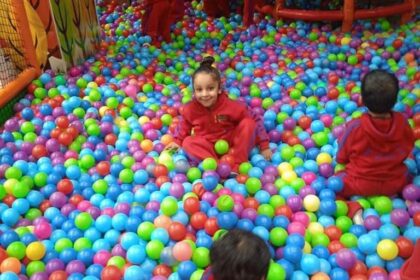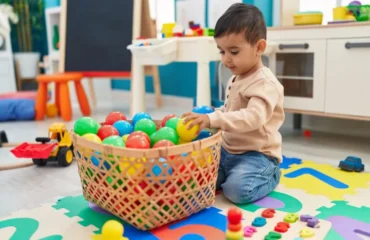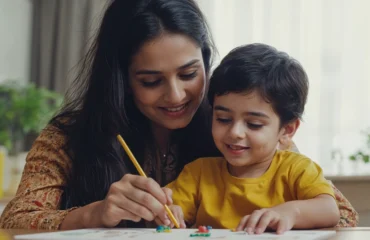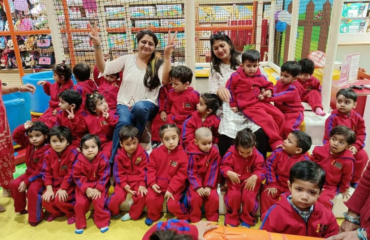
In a society where electronic devices and controlled practices are commonplace, the practice of play may seem like a relic from another period. Still, youngsters find the foundation of their emotional, social, and intellectual identities in this seemingly simple act. Play-based learning is a dynamic method that promotes the importance of play in developing young brains and is tucked away at the Centre of childhood development. In this blog, we will explore what play-based learning is, the importance of play-based learning, the benefits of play-based learning, and much more!
What is Play-Based Learning?
Play-based learning is a method of teaching that makes use of play as the main source of learning. With this approach, as opposed to traditional, planned teaching techniques, kids can follow their natural curiosity and interests to explore, discover, and learn about the world around them at their own speed. Using this approach, children can create stories via play, and the classroom becomes a creative, imaginative, and exploratory space.
Importance of Play-based Learning
Programs for play-based learning aim to support your child’s learning by allowing them to explore their interests. where children are the focus of the activities in a learning setting assisted by the teacher.
Play is the main way to discover in this non-traditional learning setting. Children develop imaginative thinking skills through independent investigation, which helps them to solve issues.
Play-based learning spaces are typically divided into parts like reading nooks, natural and textural play areas, object or block areas, and imaginative play areas. Through experimenting with various play environments, kids begin to think, read, write, draw, and speak independently.
Components of Play-Based Learning
Play-based learning consists of the following components:
- Self-direction: the kid chooses what to play, how to play it, and how long to spend exploring on their own. While teachers can offer guidance or supervision, it is ultimately up to the child’s curiosity to determine what is best for them.
- Unstructured: in the absence of restrictions, kids independently study and explore at their own speed and convenience. following their interests and not following any set path.
- Process-oriented learning is centered on the steps involved, rather than a predetermined ideal.
- Fun: a place where learning is pleasurable. Without feeling coerced, the child enjoys and feels engaged in what they’re doing.
- Imagination: the unrestricted ability to be imaginative and engage in “make-believe.”
Benefits of Play-Based Learning
A child’s whole development is supported by play-based learning. To succeed in higher education, they must acquire cognitive, motor, emotional, social, and creative skills. Below are some of the benefits of play-based learning:
Promoting Mental Growth
The influence of play-based learning on cognitive growth is among its most important advantages. Children develop their critical thinking, problem-solving, and decision-making skills through play. They practice counting, identifying patterns, and comprehending spatial relationships through various exercises, which lays the groundwork for mathematical and scientific reasoning.
Improving Interpersonal Communication
Additionally essential to the development of communication skills is play-based learning. Children learn to express themselves, listen to others, and negotiate roles and boundaries through play interactions with peers and adults. Through this contact, their vocabulary grows, and they get a better understanding of social signs and language nuances.
Developing Emotional and Social Intelligence
Play-based learning fosters a social setting that helps kids learn how to empathies, comprehend diverse viewpoints, and control their emotions. They gain cooperation, sharing, and friendship-building abilities via play—all of which are necessary for future success on both a personal and professional level.
Encouragement of Physical Growth
Play-based learning incorporates the body as well as the mind. Children learn balance, coordination, and motor abilities through physical play. It promotes physical activity, aids in the formation of healthy bodies, and establishes habits that can contribute to lifelong health.
Boosts Self-Belief and Positive Views About Learning
Through practical learning, play-based activities assist children in developing their self-confidence. Children who feel more confident are more willing to try new things and take chances. They get the ability to make independent judgements and experience a feeling of achievement.
Top 5 Play-Based Learning Activities for Children
Below are five play-based learning activities for children:
- Storytelling and Puppet Shows
Objective: Improve linguistic abilities, imaginative thinking, and emotional intelligence.
Activity: Using a combination of store-bought, homemade, and improvised puppets, children make up their own stories. Either an individual or a group can complete this. After that, they tell their story to family members or other peers.
Learning: Enhances children’s comprehension and expression of emotions, fosters imaginative play, and improves language and communication abilities.
- Bins with Sensory Information
Objectives: Improve sensory awareness, cognitive function, and fine motor skills.
Activity: Stuff a variety of materials—like sand, water, rice, or beans—into bins. Add objects such as toys, shells, or other items associated with a theme or idea under investigation. Kids investigate these materials with their hands, locating and classifying things.
Learning: Improves fine motor skills, sensory processing, and cognitive skills like sorting, classifying, and problem-solving.
- Building Blocks and Construction
Objectives: Encourage problem-solving, creativity, and spatial awareness.
Activity: Give kids construction sets, LEGO, or other building supplies. Give them tasks like building particular structures, coming up with original designs, or replicating models.
Learning: Promotes creativity and problem-solving while honing fine motor skills and spatial awareness. Additionally, it helps people comprehend mathematical ideas like measurements, symmetry, and balance.
- Scavenger hunts in nature
Objective: Encourage movement, keen observation, and an understanding of the natural environment.
Activity: Set up an outdoor scavenger hunt where kids search for particular objects in the wild, including particular kinds of leaves, rocks, or insects. Depending on the children’s reading levels, use written or image cues.
Learning: Promotes movement, the ability to observe, and scientific reasoning. Youngsters become aware of the environment and learn about wildlife.
- Playing roles and dressing up
Objective: Develop empathy, creative play, and social skills.
Activity: Set up a mirror, several costumes, and props in a dress-up area. Encourage kids to pretend to be various personalities or occupations through scheduled play or unstructured play.
Learning Objectives: Enhances empathy, communication abilities, and social and emotional growth. It encourages imaginative play and lets kids investigate various viewpoints. This is a best time to read our article on 10 Engaging Preschool Activities to Keep Your Little Ones Busy at Home
Play-based learning is an enjoyable approach to fostering children’s intellectual, social, and creative development. It teaches critical skills through games and activities, including dress-up, block play, and storytelling. With play and exploration, this method prepares children for the future while making learning fun and boosting self-esteem.
FAQs
What is the concept of play-based learning?
Engaging in play-based learning promotes speaking, reading, writing, and thinking. Your child will learn literacy and numeracy as natural parts of their daily lives as a result of this. You’ll be astounded at what you two can learn if you play along with them!
How do you promote play-based learning?
By probing the child about their activities during unstructured play, teachers can foster critical thinking and a connection to the topic matter. Students can interpret their behaviors and goals with open-ended questions because they are not under any time constraints to give the right response.
What are the principles of play-based learning?
Play allows both kids and adults to explore social relationships, take chances, test theories, test ideas, experiment with symbol systems, and invent new worlds. They grow in their capacity for agency, empathy, and inventiveness. They can handle uncertainty.





